Football
Sri Lankan Football in Crisis: Corruption, Mismanagement, and a Forgotten Future
Sri Lankan football is facing an unprecedented crisis, with corruption, financial mismanagement, and neglect threatening to erase any hope for the sport’s future. Despite repeated warnings, investigations, and calls for reform, the Football Federation of Sri Lanka (FFSL) under its current leadership has continued to operate with impunity, ignoring the development of local players while prioritizing foreign-born recruits.
Audit Findings Ignored – Where is the Accountability?
The Ministry of Sports’ audit report uncovered multiple financial discrepancies within FFSL, yet no action has been taken to rectify them. The Finance Committee raised critical concerns, including:
- Unpaid Media Rights Payment of USD 10,000
- A missing payment for SAFF Sri Lanka match media rights, with public service media confirming they never received the funds.
- The Finance Committee instructed immediate resolution, yet no updates have been provided.
- Unresolved Zolo Football Purchase
- FFSL paid LKR 12,775,000 for Zolo footballs from Ceylon Professional Sports Management (CPSM) without a financial guarantee, violating tender procedures.
- The Finance Committee recommended either securing the footballs or recovering the funds, with escalation to the CID if unresolved. No progress has been reported.
- Unpaid Sponsorship Payment of USD 30,000
- Sponsorship funds from Public Service Media (PSM) for the Mahinda Rajapaksa Trophy remain unaccounted for.
- Despite instructions to resolve the matter, FFSL has failed to provide any updates.
FFSL’s Downward Spiral – A Lost Generation of Footballers
While Sri Lanka’s football governance remains plagued by corruption, the country’s domestic football structure has completely collapsed. There have been no domestic tournaments since 2022, depriving young players of a pathway to professional football. Despite over 42,000 active school-level players across 600 schools, FFSL has failed to support grassroots development, instead using school tournaments for branding while parents bear the costs.
Rather than investing in homegrown talent, the FFSL has prioritized recruiting foreign-based players to represent Sri Lanka’s national team. The current squad is unrecognizable, with only captain Sujan Perera representing local talent. Critics argue that these foreign recruits, most of whom play in third or fourth-tier leagues abroad, are using Sri Lankan representation to boost their own careers while the nation’s domestic football stagnates.
Sri Lanka’s Footballing Reputation in Tatters
The state of Sri Lankan football reached an embarrassing low during the AFC Cup qualifiers when head coach Abdullah Almutairi received a red card—a rare and humiliating moment in international football. Meanwhile, Sri Lanka’s FIFA ranking has plummeted from 124th to 200th out of 207, driven by alleged embezzlement of FIFA and AFC funds under successive FFSL presidents.
Unlike successful footballing nations, which integrate foreign-origin players into domestic leagues before calling them up to the national team, Sri Lanka’s approach has been reckless and damaging. The lack of Pro License coaches for the past 30 years has further exacerbated the decline, leaving Sri Lanka lagging behind regional peers like India and the Maldives.
FFSL’s Financial Mismanagement & Political Interference
- FFSL has failed to present audited accounts since 2022, with officials suppressing the ministry’s audit report to avoid scrutiny.
- Stolen equipment, including Adidas footballs, bags, and boots, has been traced to top FFSL officials, including former national captains and the finance manager. CCTV footage reportedly supports these claims.
- Despite widespread allegations, successive sports ministers have turned a blind eye, allowing FFSL officials to manipulate narratives and maintain their grip on power.
- The Annual General Meeting (AGM) for 2023-2024 has been postponed until March 2025—deliberately delaying accountability measures.
Will the Government Finally Take Action?
The newly elected government, led by President Anura Kumara Dissanayake, campaigned on an anti-corruption platform. Yet, despite the Ministry of Sports uncovering serious financial mismanagement, no action has been taken to hold FFSL accountable.
The time for promises has long passed. If Sri Lanka is to salvage its footballing future, immediate intervention is needed from the government, FIFA, and relevant stakeholders. Failure to act now will not only doom the sport but also betray the thousands of young Sri Lankan footballers who still dream of wearing the national jersey.
The question remains: Will the government finally clean up the mess in Sri Lankan football, or will corruption continue to suffocate the game?
Football
Abdullah Al Mutairi Bids Farewell to Sri Lanka Football After Contract Ends
Sri Lanka national football head coach Abdullah Al Mutairi has officially concluded his tenure with the Football Federation of Sri Lanka (FFSL), bringing an end to a period widely viewed as one of progress and renewed belief for the national team.
The Kuwaiti coach confirmed the development via a Facebook post, stating that his contract with FFSL ended by mutual agreement. Reflecting on his journey, Al Mutairi expressed appreciation to everyone who contributed to Sri Lankan football during his time in charge.
“I would like to share that my contract with Football Sri Lanka has come to an end by mutual agreement between all parties,” Al Mutairi wrote. “I extend my sincere thanks and appreciation to everyone I had the honor of working with during this journey.”
Al Mutairi thanked Sri Lankan football fans for their unwavering support and praised the players for their commitment, discipline, and fighting spirit. He also acknowledged the efforts of the coaching staff and support personnel who worked behind the scenes to drive the team forward.
Special appreciation was reserved for FFSL President Jaswar Umar, whose trust and full backing, according to Al Mutairi, played a crucial role in the national team’s achievements. The coach noted that strong leadership from the federation allowed the team to grow both technically and mentally on the international stage.
During his tenure, Sri Lanka showed clear improvement in performance and competitiveness, recording notable victories against higher-ranked opponents and earning increased respect within the region. Enhanced tactical discipline, improved fitness levels, and stronger team unity were widely regarded as key areas of progress under his leadership.
One of the standout moments of Al Mutairi’s time in charge was Sri Lanka’s historic qualification to the second round of the AFC World Cup qualifiers, a major milestone for the nation and a significant step forward in its footballing journey.
As he departs, Al Mutairi expressed gratitude for the experiences and memories gained and wished Sri Lankan football continued success. While his chapter as head coach has come to a close, the foundations laid during his tenure are expected to leave a lasting impact on the national team’s future development.
Football
Sri Lanka Fall 2–1 to Timor-Leste in Final Group Match, Ending AFC U-17 Asian Cup Qualifiers Campaign
Sri Lanka’s AFC U-17 Asian Cup Qualifiers campaign came to an unexpected conclusion with a 2–1 defeat to Timor-Leste in their final Group A match in Chongqing. With both teams entering the fixture on three points, the match served as a direct battle for a fourth-place finish in the group. Despite pre-match expectations and form analysis suggesting Sri Lanka held the advantage, Timor-Leste delivered the stronger performance on the day.
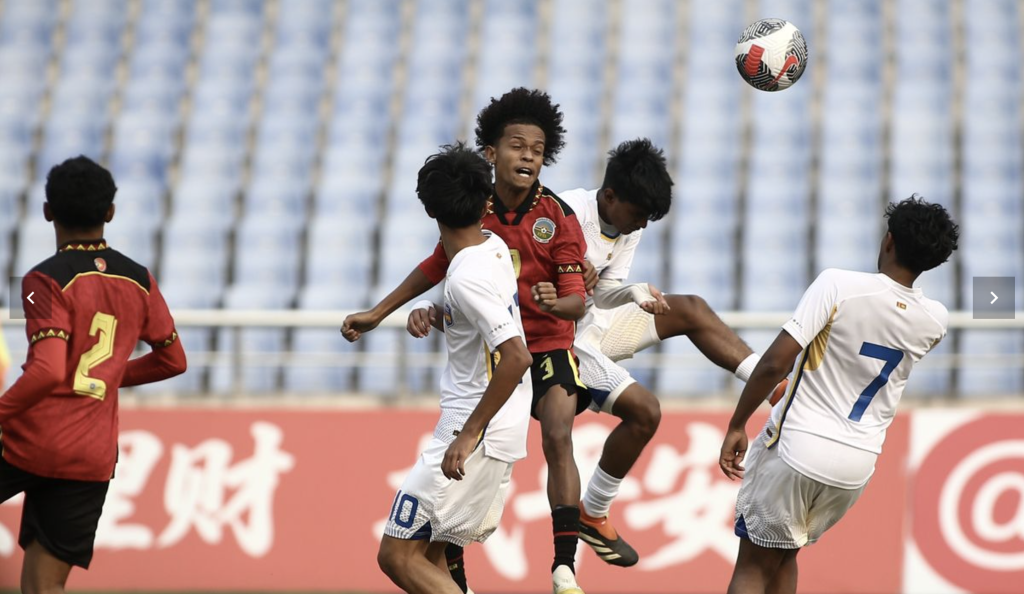
Timor-Leste took control early and displayed greater urgency, breaking the deadlock in the 26th minute through Elton Da Conceicao, who capitalised on defensive hesitation to put his side ahead. Sri Lanka struggled to settle into rhythm, often losing second balls and failing to connect effectively in midfield.
The second half saw Timor-Leste continue to dictate play, maintaining higher intensity and pressing Sri Lanka into mistakes. Their persistence was rewarded in the 63rd minute when Jyzeus Gabriel Lay doubled the lead with a composed finish following a break in transition.
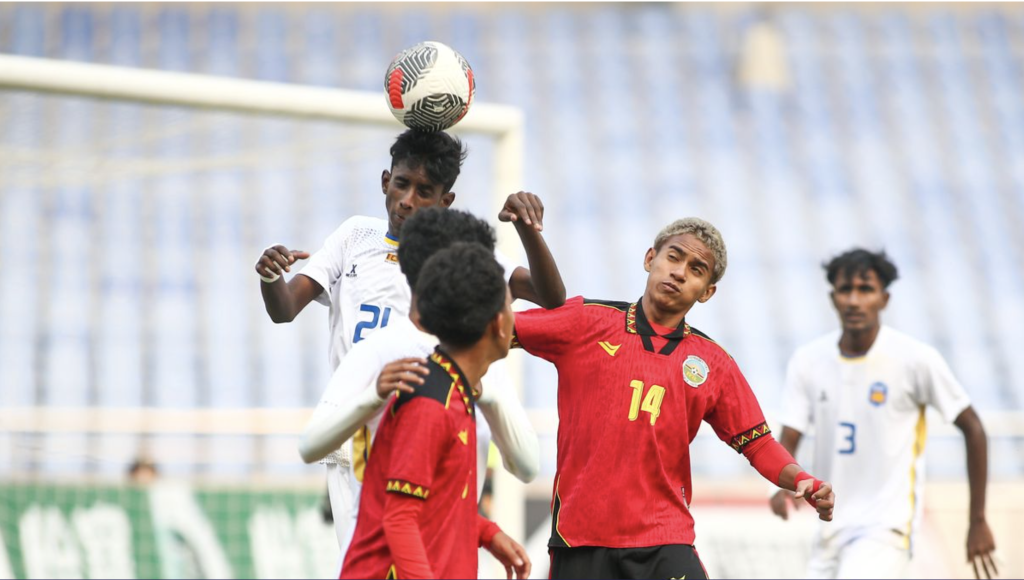
Sri Lanka managed to pull one goal back deep into stoppage time, as Ishaq found the net with a well-taken effort, but it was too late to alter the outcome. The result places Sri Lanka fifth in Group A, behind China PR, Bangladesh, Bahrain, and now Timor-Leste.
This outcome contradicts earlier projections that favoured Sri Lanka based on Timor-Leste’s previous results and goal difference. However, football at youth level often hinges on momentum, confidence, and adaptability—areas where Timor-Leste outperformed Sri Lanka on the day.
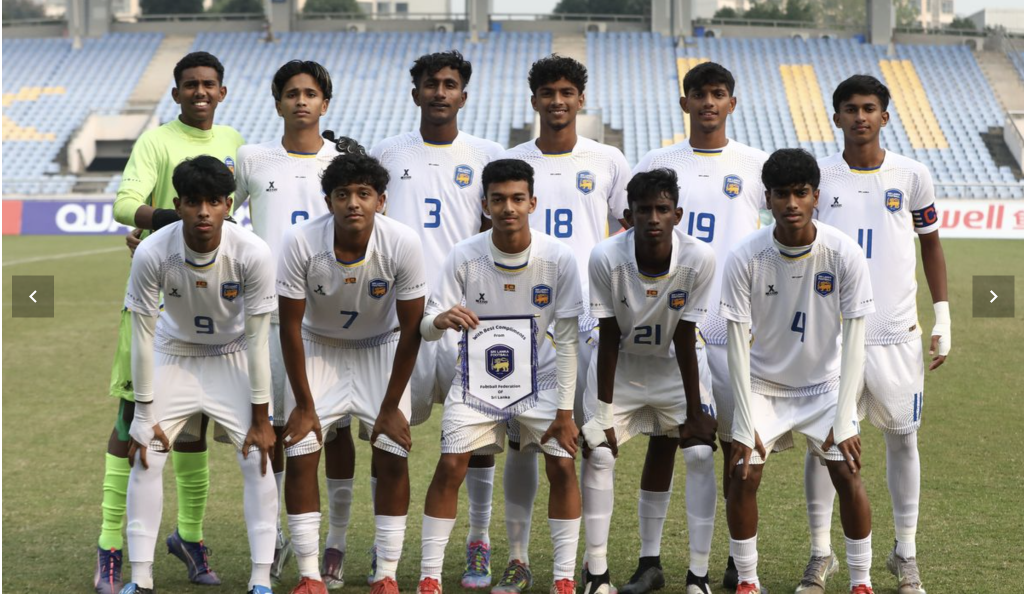
Sri Lanka conclude their campaign with one win and four losses, scoring six goals and conceding 17. While the tournament exposed defensive vulnerabilities and structural weaknesses, it also offered valuable international experience for a young squad still developing physically and tactically.
The focus now shifts to refining youth systems, improving defensive organisation, and strengthening player development pathways. The qualifiers may not have produced the results Sri Lanka had hoped for, but they provided clarity on the areas that require attention as the nation continues to rebuild at youth level.
Football
Sri Lanka Suffer 8–0 Defeat to China PR in AFC U-17 Asian Cup Qualifiers – Matchday 4 Update
Sri Lanka’s AFC U-17 Asian Cup Qualifiers campaign took another difficult turn on Matchday 4 as they fell 8–0 to a dominant China PR side in Chongqing. China, who entered the fixture with 30 goals scored and none conceded, continued their perfect run with a commanding and clinical performance.
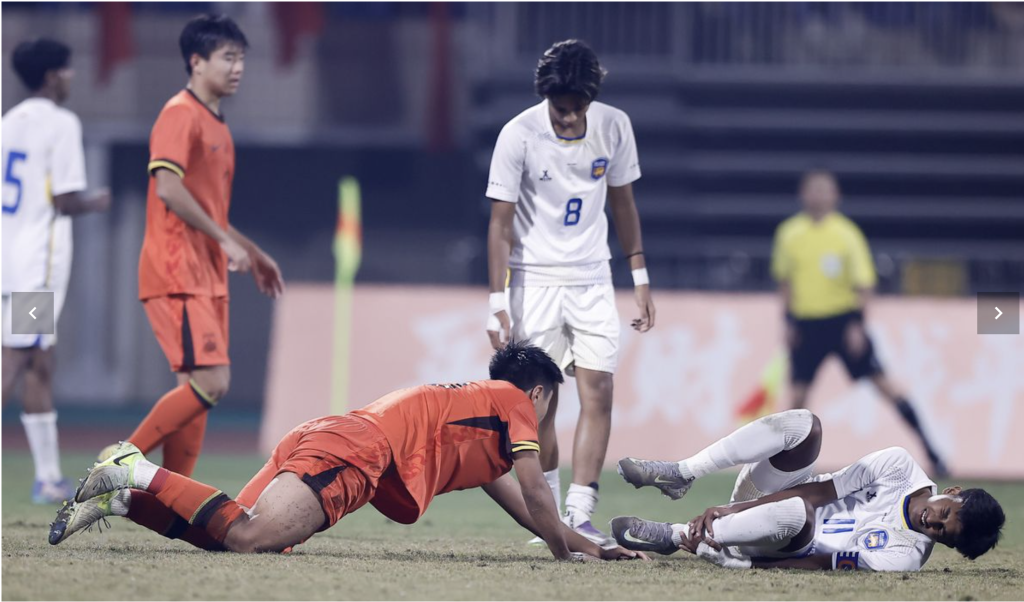
The defeat also slightly exceeded the earlier projected scoreline, as forecasts suggested a heavy loss in the range of 6–0 based on China’s form and Sri Lanka’s defensive struggles. China ultimately pushed beyond that margin with relentless second-half pressure and superior physicality.
China took control early when Zhao Songyuan opened the scoring in the 13th minute. Zhang Xuyao doubled the lead before the half-hour mark, and Kuang Zhaolei’s 41st-minute strike effectively settled the outcome before halftime.
The second half offered little relief for Sri Lanka. China maintained full command of possession and territory, adding five more goals through He Sifan (47’), Shuai Weihao (55’), Wan Xiang (75’, 77’) and Zhang Bolin (84’). The hosts’ sustained pressure, intelligent movement between the lines, and ruthless finishing highlighted the gap between the two nations at this age level.
With the win, China remain unbeaten with four straight victories, keeping pace with Bangladesh at the top of Group A. Owing to a significantly superior goal difference, China will only need a draw against Bangladesh on Sunday to finish as group leaders.
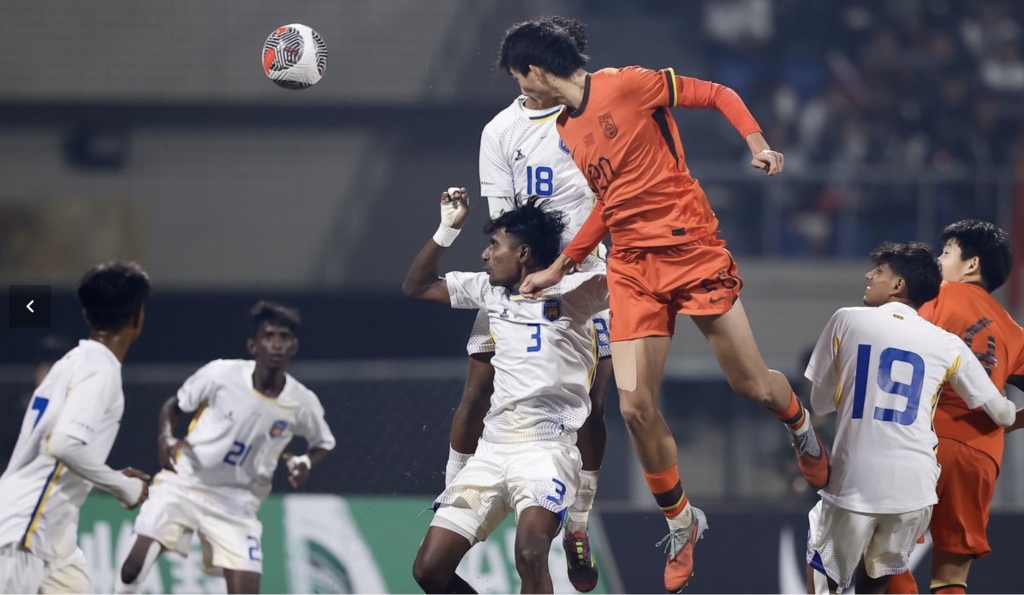
For Sri Lanka, the result reinforces the defensive and structural challenges identified throughout the campaign — particularly in dealing with high-pressing teams and managing space between defensive lines. The team now turns its attention to their final group match against Timor-Leste, a fixture they are expected to approach with confidence and a realistic chance of securing a second victory.
Sri Lanka have one match remaining in the qualifiers and will aim to finish on a stronger note as they continue their learning curve at continental level.
If you need an updated standings table, match preview for Sri Lanka vs Timor-Leste, or social media posts for this result, I can prepare those next.
Updated Group A Standings (After Matchday 4)
| Team | P | W | D | L | GF | GA | GD | Points |
|---|---|---|---|---|---|---|---|---|
| China PR | 4 | 4 | 0 | 0 | 38 | 0 | +38 | 12 |
| Bangladesh | 4 | 4 | 0 | 0 | 23 | 5 | +18 | 12 |
| Bahrain | 4 | 2 | 0 | 2 | 7 | 6 | +1 | 6 |
| Sri Lanka | 4 | 1 | 0 | 3 | 5 | 15 | -10 | 3 |
| Timor-Leste | 4 | 0 | 0 | 4 | 0 | 30 | -30 | 0 |
| Brunei Darussalam | 4 | 0 | 0 | 4 | 0 | 24 | -24 | 0 |
Sri Lanka vs Timor-Leste – Match Preview
Sri Lanka enter their final AFC U-17 Asian Cup Qualifiers Group A match against Timor-Leste with a crucial opportunity to end the campaign on a positive note. Both teams have faced heavy defeats throughout the group stage, with Timor-Leste failing to score a single goal and conceding 30.
Sri Lanka showed strong attacking quality in their 4–0 win over Brunei and were competitive in stretches against Bahrain before losing 2–1. Despite the 8–0 loss to China PR, the team retains the advantage in pace, transitional play, and individual technical ability over Timor-Leste.
Timor-Leste have struggled to maintain defensive shape and have been vulnerable in both wide areas and in transition. Their inability to build out from pressure offers Sri Lanka a clear opportunity to dominate possession and control attacking phases.
This match represents Sri Lanka’s best chance to secure a second win and finish the group in fourth place.
Match Prediction – Sri Lanka vs Timor-Leste
The previous prediction for this match was 3–1 in favour of Sri Lanka.
Based on both teams’ updated performances and form trends, this prediction remains accurate.
Predicted result: Sri Lanka 3–1 Timor-Leste
Sri Lanka are expected to:
• Control the midfield
• Create more chances from wide areas
• Use pace effectively in transition
• Limit Timor-Leste’s attacking threat
-

 Football1 year ago
Football1 year agoSri Lanka Schools National Championship 2025: Super 8 Fixtures and Grouping
-

 News1 year ago
News1 year ago2025 Schools Rugby Season Set to Thrill Fans with Knockout and League Action
-

 Cricket9 months ago
Cricket9 months agoNuwan Thushara Shines as RCB Storms into IPL 2025 Final
-

 Live4 years ago
Live4 years agoLive Broadcast of Syria vs Sri Lanka | AFC U23 Asian Championship Qualification
-

 News9 months ago
News9 months agoMajor Shake-Up in Sports Governance: New 2025 Regulations Reform National Sports Bodies in Sri Lanka
-

 Cricket1 year ago
Cricket1 year agoSri Lanka’s Greatest Cricketers: Top Batters and Bowlers of All Time
-

 Football1 year ago
Football1 year agoFFSL Rebrands Division-1 as ‘League-One’ with a Bold New Vision
-
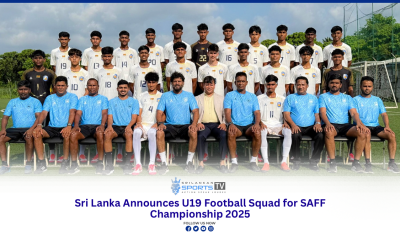
 Football10 months ago
Football10 months agoSri Lanka Announces U19 Football Squad for SAFF Championship 2025








You must be logged in to post a comment Login